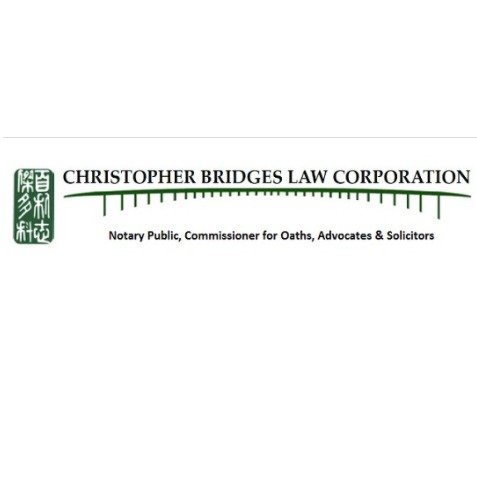Best Immigration Lawyers in Singapore
Share your needs with us, get contacted by law firms.
Free. Takes 2 min.
Or refine your search by selecting a city:
List of the best lawyers in Singapore
About Immigration Law in Singapore
Immigration law in Singapore governs the entry, stay, and exit of foreign nationals into the country. The framework is primarily focused on regulating the flow of people coming in for work, study, or residence. The Ministry of Manpower (MOM) and the Immigration and Checkpoints Authority (ICA) are the main regulatory bodies overseeing immigration matters. The laws are designed to balance economic growth with social stability, ensuring that Singapore maintains its global competitiveness while also securing the welfare of its citizens.
Why You May Need a Lawyer
While many immigration processes in Singapore are straightforward, certain situations may necessitate the guidance of a lawyer. Common scenarios include:
- Complex visa applications: Understanding various visa categories and requirements can be difficult, especially for employment passes or permanent residency.
- Deportation or removal proceedings: If you face deportation, a lawyer can help defend your rights and navigate the legal process.
- Appeals: If your visa application is rejected, a lawyer can assist in drafting appeals and representing you in legal proceedings.
- Business immigration: Entrepreneurs or investors may need legal advice on business setup, compliance, and immigration requirements.
- Family reunion: Legal advice can be crucial for those seeking to bring family members to Singapore through dependent passes or long-term visit passes.
Local Laws Overview
Key aspects of local immigration laws in Singapore include:
- Entry and Visa Requirements: Depending on nationality, visitors may require a visa to enter Singapore. Visa types vary from short-term visit visas to long-term work permits.
- Work Passes: Different types of work passes cater to various skill levels and sectors, including the Employment Pass, S Pass, and Work Permit.
- Permanent Residency: PR status is a coveted position offering more stability and benefits similar to citizens, yet the application process is highly competitive.
- Citizenship: Foreign nationals can apply for Singaporean citizenship, subject to eligibility requirements and stringent evaluation.
- Student Passes: Foreign students need specific passes to study in Singapore, with different conditions for polytechnic, university, or other educational institutions.
Frequently Asked Questions
What are the main types of work permits in Singapore?
Singapore offers several work permits, including the Employment Pass, S Pass, and Work Permit, each catering to different levels of skill and salary criteria.
How can I apply for permanent residency in Singapore?
Applications for PR can be made to the ICA, and eligibility typically depends on factors like employment history, skills, and family ties to Singapore.
What should I do if my visa application is rejected?
If your visa application is rejected, you can appeal the decision. It is often beneficial to consult with a lawyer to understand the reasons for rejection and strengthen your appeal.
Can family members join me in Singapore?
Yes, family members can join through Dependant Passes or Long-Term Visit Passes, but eligibility depends on the type of visa or permit you hold.
How long does the PR application process take?
The process can take 6 to 12 months, depending on the volume of applications and individual circumstances.
Are there any quotas for work permits?
Yes, certain sectors have quotas and levy requirements for employing foreign workers, affecting the number of Work Permits issued.
What documents are needed for a student pass application?
Usually, official acceptance from a recognized institution, proof of financial support, and academic certificates are required for a student pass.
Is it possible to appeal a deportation order?
Yes, you can appeal a deportation order, and legal representation is advisable to navigate the appeal process effectively.
How can I check the status of my immigration application?
Application statuses can generally be checked online through the ICA or MOM websites or by contacting them directly.
What are the penalties for overstaying a visa in Singapore?
Overstaying can result in fines, jail time, or being barred from re-entering Singapore. It is crucial to address such situations promptly, possibly with legal assistance.
Additional Resources
Several resources can assist those seeking immigration advice in Singapore:
- Ministry of Manpower (MOM): Handles work passes and employment-related visas.
- Immigration and Checkpoints Authority (ICA): Manages entry visas, PR applications, and citizenship matters.
- Law Society of Singapore: Offers directories and resources to find legal professionals.
- Relevant Embassies or Consulates: Can provide guidance specific to your nationality.
- Community Services: Such as the Migrant Workers’ Centre, which can offer non-legal support and guidance.
Next Steps
If you require legal assistance in immigration matters, consider the following steps:
- Clearly define your needs or specific issues related to immigration.
- Gather all necessary documentation and information to expedite the legal consultation process.
- Use the Law Society of Singapore's directory to find qualified immigration lawyers.
- Schedule consultations to discuss your case, understand fees, and the possible outcomes before proceeding.
- Stay informed about changes in local immigration laws by regularly checking government websites and announcements.
Lawzana helps you find the best lawyers and law firms in Singapore through a curated and pre-screened list of qualified legal professionals. Our platform offers rankings and detailed profiles of attorneys and law firms, allowing you to compare based on practice areas, including Immigration, experience, and client feedback.
Each profile includes a description of the firm's areas of practice, client reviews, team members and partners, year of establishment, spoken languages, office locations, contact information, social media presence, and any published articles or resources. Most firms on our platform speak English and are experienced in both local and international legal matters.
Get a quote from top-rated law firms in Singapore — quickly, securely, and without unnecessary hassle.
Disclaimer:
The information provided on this page is for general informational purposes only and does not constitute legal advice. While we strive to ensure the accuracy and relevance of the content, legal information may change over time, and interpretations of the law can vary. You should always consult with a qualified legal professional for advice specific to your situation.
We disclaim all liability for actions taken or not taken based on the content of this page. If you believe any information is incorrect or outdated, please contact us, and we will review and update it where appropriate.
Browse immigration law firms by service in Singapore
Singapore Attorneys in related practice areas.
Browse immigration law firms by city in Singapore
Refine your search by selecting a city.













